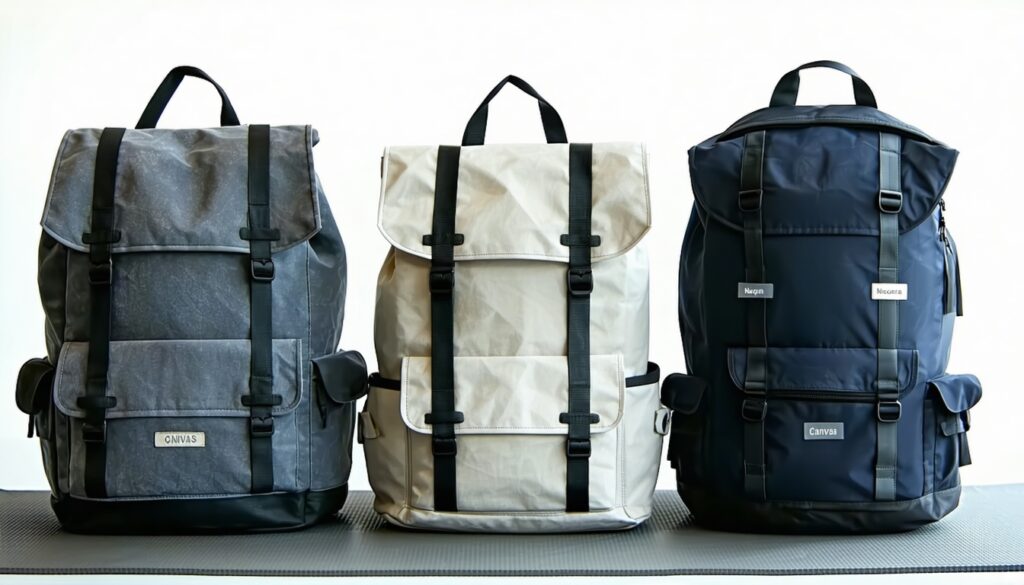Find Your Perfect Fit: Canvas vs Neoprene vs Nylon Yoga Backpacks

Yoga Backpack Materials
When selecting a yoga backpack, the material plays a significant role in its functionality, durability, and style. Here, we will explore three popular materials used in yoga backpacks: canvas, nylon, and neoprene.
Canvas Yoga Backpacks
Canvas yoga backpacks are favored for their classic look and strength. This material is known for its ability to withstand heavy loads, making it a popular choice for individuals who prioritize both functionality and style. The sturdy nature of canvas ensures that it can handle the weight of yoga mats, blocks, and other essentials without compromising its integrity.
| Feature | Description |
|---|---|
| Strength | High durability, suitable for heavy loads |
| Aesthetic | Classic and stylish appearance |
| Maintenance | Generally easy to clean and maintain |
For more information on how to choose the right yoga backpack, check out our guide on how to choose the right yoga backpack for your practice.
Nylon Yoga Backpacks
Nylon yoga backpacks are known for their durability and water resistance. This lightweight material is often chosen for its ability to withstand rough handling and adverse weather conditions, making it a practical choice for individuals with an active lifestyle. Nylon backpacks are also easy to clean and dry quickly, which is beneficial for those who frequently practice yoga outdoors or in varying environments.
| Feature | Description |
|---|---|
| Durability | Resistant to wear and tear |
| Water Resistance | Protects contents from moisture |
| Weight | Lightweight and easy to carry |
For tips on the best lightweight options, visit our article on best lightweight yoga backpacks for commuting.
Neoprene Yoga Backpacks
Neoprene fabric is renowned for its combination of water resistance, flexibility, and thermal insulation. This material is commonly used in various industries, particularly in sports and outdoor wear. Neoprene yoga backpacks offer a snug fit for yoga mats and accessories, ensuring that items are securely held in place during transport.
| Feature | Description |
|---|---|
| Flexibility | Adapts to the shape of contents |
| Insulation | Provides thermal protection for sensitive items |
| Water Resistance | Keeps contents dry in wet conditions |
For more insights on the benefits of different materials, check out our article on yoga mat backpack vs tote vs strap: pros and cons.
Understanding the materials used in yoga backpacks can help health-conscious individuals make informed choices that align with their lifestyle and preferences.
Advantages of Canvas Yoga Backpacks
Canvas yoga backpacks offer a unique blend of style and functionality, making them a popular choice among health-conscious individuals who practice yoga regularly. Here are some key advantages of choosing a canvas yoga backpack.
Strength and Durability
Canvas is known for its strength and durability, making it an excellent material for yoga backpacks. These bags can withstand heavy loads, which is essential for carrying yoga mats, blocks, towels, and other gear. The robust nature of canvas ensures that it can handle the wear and tear of daily use, whether heading to a yoga class or traveling to a retreat. According to MOWIN Yoga, canvas bags are favored for their ability to endure heavy loads while maintaining their shape and integrity.
| Feature | Canvas Yoga Backpacks |
|---|---|
| Material Strength | High |
| Load Capacity | Excellent |
| Wear Resistance | Good |
Classic Aesthetic
One of the standout features of canvas yoga backpacks is their classic aesthetic. The timeless look of canvas makes it a versatile choice that can complement various styles, from casual to more fashionable outfits. Canvas is perfect for those who appreciate a retro or vintage vibe, as it adds a touch of character to any ensemble. This aesthetic appeal is highlighted by FittDesign, which notes that canvas is a favorite in fashion-forward backpacks and tote bags.
| Aesthetic Feature | Canvas Yoga Backpacks |
|---|---|
| Style | Classic/Vintage |
| Versatility | High |
| Fashion Appeal | Strong |
Canvas yoga backpacks not only provide the strength needed for daily use but also offer a stylish option for those looking to express their personality while carrying their yoga essentials. For more insights on selecting the right yoga backpack, check out our guide on how to choose the right yoga backpack for your practice.
Advantages of Nylon Yoga Backpacks
Nylon yoga backpacks offer several benefits that make them a popular choice among health-conscious individuals who practice yoga regularly. Their durability, water resistance, and lightweight nature are key features that enhance their functionality and appeal.
Durability and Water Resistance
Nylon is renowned for its strength and resilience, making it an excellent material for yoga backpacks. These bags can withstand rough handling and adverse weather conditions, ensuring that they remain intact even during active use. According to MOWIN Yoga, nylon yoga bags are particularly valued for their durability and water resistance, making them a practical choice for individuals with an active lifestyle.
| Feature | Description |
|---|---|
| Durability | Resistant to wear and tear, ideal for frequent use |
| Water Resistance | Protects contents from moisture and light rain |
Lightweight Nature
Another significant advantage of nylon yoga backpacks is their lightweight nature. This feature makes them easy to carry, especially for those who commute to yoga classes or travel frequently. Nylon is commonly used in outdoor and sport backpacks due to its light weight, which allows users to carry their yoga gear without feeling weighed down.
| Weight Comparison | Nylon Backpack | Canvas Backpack | Neoprene Backpack |
|---|---|---|---|
| Average Weight | Light | Medium | Medium-Heavy |
Nylon and polyester bags are also typically more affordable, making them a great option for budget-conscious yogis. This combination of durability, water resistance, and lightweight properties makes nylon yoga backpacks a practical and stylish choice for anyone looking to carry their yoga gear efficiently. For more insights on selecting the right backpack, check out our guide on how to choose the right yoga backpack for your practice.
Advantages of Neoprene Yoga Backpacks
Neoprene yoga backpacks offer unique benefits that make them a popular choice among health-conscious individuals who practice yoga. Their flexibility, insulation, water resistance, and durability set them apart from other materials.
Flexibility and Insulation
Neoprene fabric, also known as polychloroprene, is celebrated for its flexibility and insulation properties. This synthetic material was developed in the 1930s as an oil-resistant alternative to rubber and has since become a staple in various industries, particularly in fashion and sportswear.
The flexibility of neoprene allows these backpacks to easily accommodate different shapes and sizes of yoga gear, making it simple to pack and carry mats, blocks, and other accessories. Additionally, neoprene provides thermal insulation, which can help keep items like water bottles at the desired temperature during travel.
| Feature | Benefit |
|---|---|
| Flexibility | Easily accommodates various yoga gear |
| Insulation | Helps maintain temperature of items |
Water Resistance and Durability
Neoprene is renowned for its water resistance, making it an excellent choice for yoga backpacks. This feature protects the contents from unexpected spills or rain, ensuring that yoga gear remains dry and safe. The durability of neoprene also means that these backpacks can withstand wear and tear, making them suitable for regular use in various environments.
Neoprene’s combination of water resistance and durability makes it ideal for outdoor activities, travel, and daily commutes. This material is widely used in applications ranging from wetsuits to activewear, showcasing its versatility and reliability.
| Feature | Benefit |
|---|---|
| Water Resistance | Protects contents from spills and rain |
| Durability | Withstands wear and tear for long-lasting use |
For those looking to explore more about yoga backpacks, consider checking out our guide on how to choose the right yoga backpack for your practice or learn about the best lightweight yoga backpacks for commuting.
Choosing the Right Material
Selecting the right material for a yoga backpack is essential for health-conscious individuals who regularly practice yoga. The choice often depends on personal preferences, lifestyle, and environmental values.
Personal Preferences and Lifestyle
When choosing a yoga backpack, individuals should consider their personal preferences and lifestyle. Each material—canvas, nylon, and neoprene—offers distinct advantages and disadvantages. For instance, those who prioritize style may lean towards canvas for its classic aesthetic, while individuals seeking durability and water resistance might prefer nylon.
| Material | Key Features | Best For |
|---|---|---|
| Canvas | Classic look, durable | Style-conscious users |
| Nylon | Lightweight, water-resistant | Travelers and budget-conscious yogis |
| Neoprene | Flexible, insulated | Those needing extra protection for gear |
Understanding how each material aligns with one’s daily activities can help in making an informed decision. For example, a frequent traveler may benefit from a lightweight nylon backpack, while someone who practices outdoors might prefer a water-resistant option.
Environmental Values
Environmental values play a significant role in the decision-making process. Eco-friendly options for yoga backpacks include recycled fabrics, organic cotton, and sustainable materials like hemp. Choosing an eco-friendly yoga mat bag not only helps the planet but also enhances the practice by aligning with personal values.
Individuals who prioritize sustainability may opt for brands that focus on eco-friendly materials, such as Manduka, known for its high-quality yoga gear made from durable and sustainable materials. By evaluating the advantages and disadvantages of different materials, individuals can select a yoga bag that meets practical requirements while resonating with their personal ethos and style. For more guidance on selecting the right backpack, check out our article on how to choose the right yoga backpack for your practice.
Best Material for Yoga Backpacks
Choosing the right material for a yoga backpack is essential for health-conscious individuals who regularly practice yoga. The material impacts not only the functionality of the backpack but also aligns with personal preferences and lifestyle choices.
Aligning with Individual Needs
When selecting a yoga backpack, individuals should consider their specific needs. For those who prioritize style and functionality, canvas yoga backpacks are a popular choice. They are known for their classic look and strength, making them suitable for carrying heavy loads.
On the other hand, nylon yoga backpacks are favored for their lightweight nature and water resistance. This makes them ideal for active lifestyles, especially for those who may encounter rough handling or adverse weather conditions.
Neoprene yoga backpacks offer a unique combination of flexibility and thermal insulation, making them suitable for various activities beyond yoga.
| Material | Key Features | Best For |
|---|---|---|
| Canvas | Classic look, strong, heavy load capacity | Style and functionality |
| Nylon | Lightweight, water-resistant | Active lifestyles |
| Neoprene | Flexible, thermal insulation | Versatile activities |
Practical Requirements and Style
Practical requirements also play a significant role in the decision-making process. For example, individuals who frequently travel or commute may prefer nylon due to its durability and ability to withstand rough conditions.
Conversely, those who appreciate a more traditional aesthetic might lean towards canvas backpacks, which combine style with functionality.
Neoprene backpacks, while less common, provide unique benefits such as water resistance and flexibility, making them suitable for various outdoor activities.
Ultimately, the best material for a yoga backpack depends on individual needs, lifestyle, and personal style preferences. For more guidance on selecting the right yoga backpack, check out our article on how to choose the right yoga backpack for your practice.


